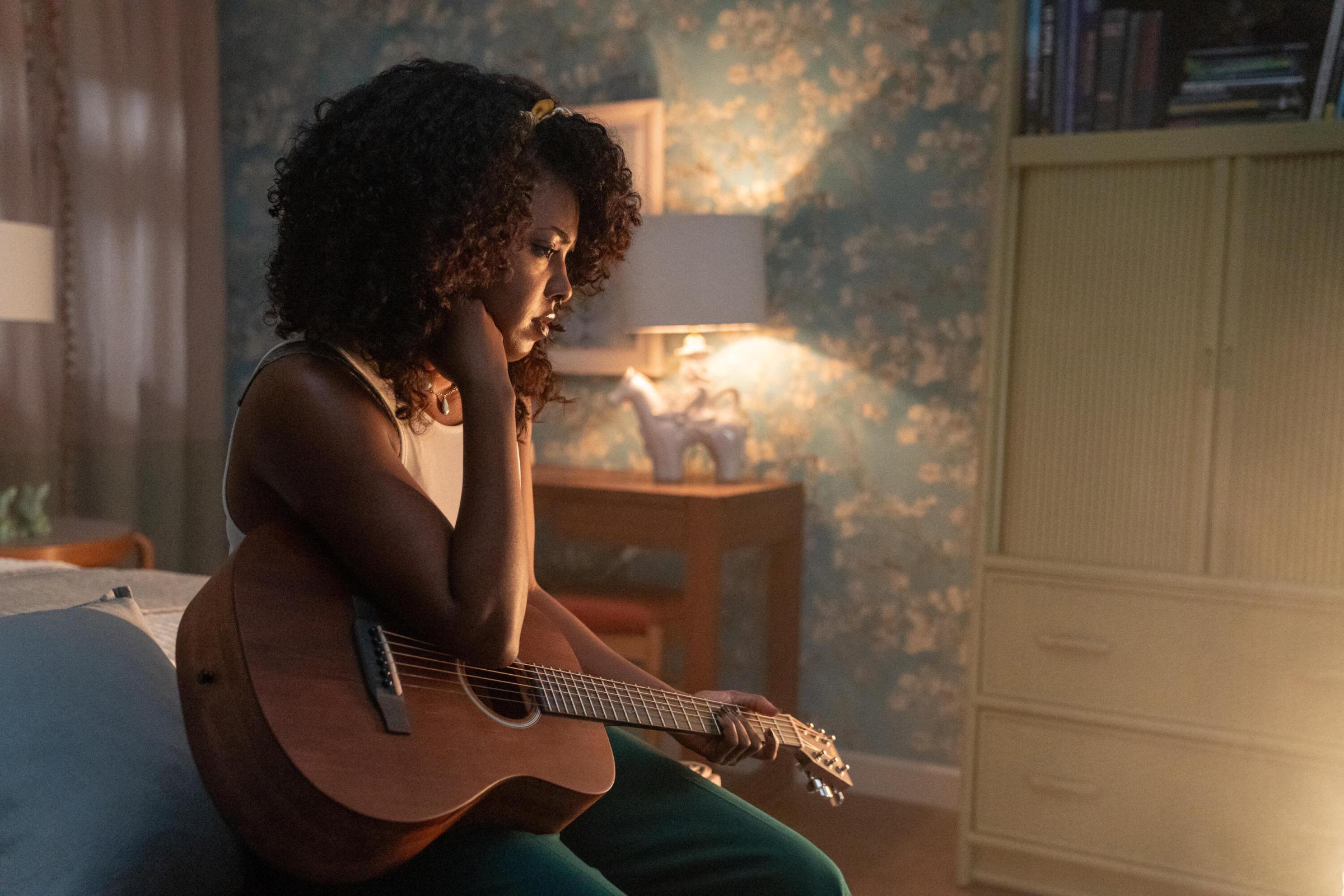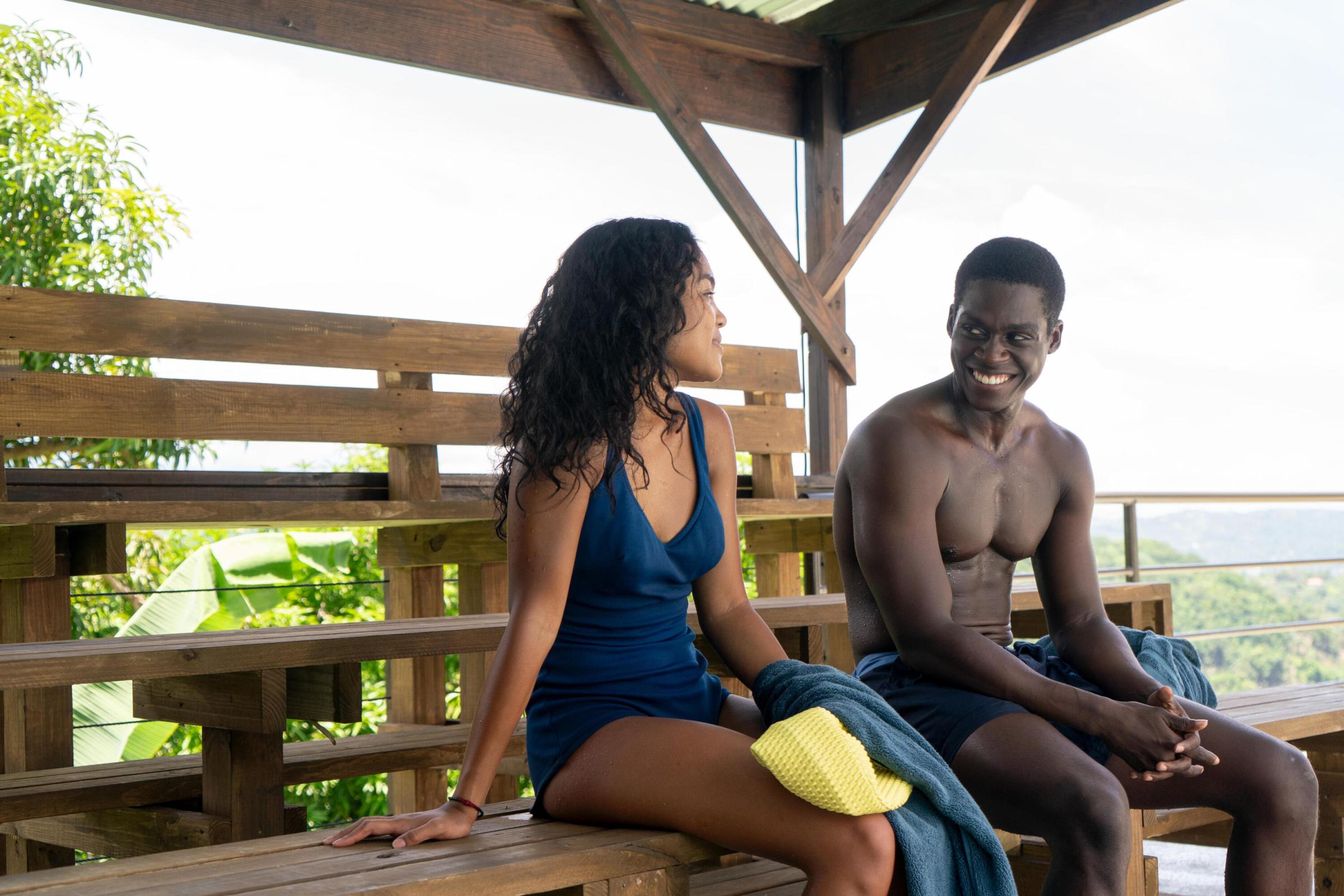Caribbean black cake may look humble, but its craggy, unfrosted surface conceals a sumptuous confection that earns its place of honor on the Christmas dinner table. It takes time to make; dried fruit soaked for days, weeks, or more in rum and brandy anchor its flavor profile. Almonds give it substance. Burnt sugar lends the dark color. There are surprising ingredients, like Manischewitz, which is often substituted for brandy. While the recipe probably began life as a variation on the plum pudding imported by British colonizers, black cake is emphatically its own sweet, dense, intoxicating, island-spiced, painstakingly assembled, culturally hybrid thing.
All of which makes it a fitting avatar for the character at the center of Black Cake, Hulu’s epic adaptation of Charmaine Wilkerson’s best-selling novel, which premieres Nov. 1. Although she dies just a few scenes into the eight-episode series, it is Eleanor Bennett—a loving mother who kept a lifetime’s worth of secrets from her children—who grounds this globe-spanning family drama. Cast as the young Eleanor in flashbacks, Not Okay star Mia Isaac skillfully plays against her own Disney-fresh effervescence, endowing the teenage girl with grit and maturity beyond her years. On the fairly frequent occasions when the script errs toward blandness or treacle, Eleanor sets it ablaze, burning off the excess sugar to uncover another layer of richness.

We meet the older Eleanor (Chipo Chung) a year before her death, in present-day Southern California, where a surfing accident leads to a diagnosis of terminal brain cancer. Her loyal son, Byron (Ashley Thomas), a high-achieving oceanographer, rushes to her side. But his younger sister Benny (Adrienne Warren), an artist who has been estranged from the family for eight years—years that included the death of their father—doesn’t show up until it’s time to read the will. Eleanor’s lawyer, Charles Mitch (Glynn Turman), has a surprise for the children she called “B and B.” Their mother left behind hours of recordings that she wants them to listen to together, along with Mr. Mitch. When the time is right, she instructs them, the siblings should take out of the freezer a small black cake that she’s baked for them and share a slice in her honor.
The series weaves together B and B’s now-parentless present with the saga that unfolds in their late mother’s oral history, a tale that stretches back to her 1960s childhood in the West Indies and contradicts everything they thought they thought they knew about her. Eleanor told her children she grew up in an orphanage. In fact, she was raised by a Chinese father and a Black mother who left the island when she was still a little girl. And her real name wasn’t Eleanor Bennett; it was Covey Lin Cook. A talented swimmer with a devoted best friend, Bunny (Lashay Anderson); a gentle boyfriend, Gibbs (Ahmed Elhaj); and dreams of competing on an international level, teenage Covey is thrust into adulthood when her desperate, alcoholic dad Lin (Simon Wan) negotiates her marriage to a local gangster, Little Man (Anthony Mark Barrow). Backed into a corner, she reluctantly goes through with it. But when Little Man is poisoned at the wedding reception, Covey fakes her own death and flees to England, where Gibbs is studying.

The mystery of who really killed Little Man persists as the girl born Covey travels across the Atlantic and back, over the course of several years, adopting and discarding new identities to hide from those who might want to avenge him. As Byron starts to unravel at the news that his mom was not the person she’d led him to believe she was, Benny finds some comfort in Eleanor’s shocking revelations. Her seemingly perfect mother had, she now realizes, struggled and suffered and made choices that haunted her for the rest of her time on Earth.
Black Cake has a few too many familiar plot beats. Byron’s story, which takes a particularly far-fetched turn in the second half of the series, never quite adds up to more than a collection of common observations about the prejudices Black men face in contemporary America. “The world can be a scary place for Black boys,” Eleanor counsels a young Byron in one flashback—and that’s hardly the only bit of boilerplate dialogue that undermines the show’s originality. More resonant and distinctive is Benny’s gradual discovery that her messiness, and the abuse she’s endured at the hands of a famous-artist lover, doesn’t make her an outlier in her family. On the contrary, it makes her more her mother’s daughter than she has ever known.
There’s no denying that Black Cake is a melodrama, teeming with passion, adversity, and tears. But this is a rare case in which the floridly emotional tone serves the story. A multifaceted heroine, authentic relationships, and strong performances (Isaac and Warren are especially great) override mediocre scripts, fostering more empathy than other heartstring-yanking adaptations of recent months, like Apple’s Lessons in Chemistry and Amazon’s The Lost Flowers of Alice Hart, could inspire. Family secrets are hardly a novel topic, but Wilkerson and creator Marissa Jo Cerar (Women of the Movement) explore the theme with uncommon elegance. Eleanor’s lies as well as her posthumous truth influence her kids to embrace honesty in their own lives. Instead of dwelling on how a difficult past bleeds into the family’s relatively comfortable present, Black Cake asks how everything B and B learn might reshape their future.
More Must-Reads from TIME
- Donald Trump Is TIME's 2024 Person of the Year
- Why We Chose Trump as Person of the Year
- Is Intermittent Fasting Good or Bad for You?
- The 100 Must-Read Books of 2024
- The 20 Best Christmas TV Episodes
- Column: If Optimism Feels Ridiculous Now, Try Hope
- The Future of Climate Action Is Trade Policy
- Merle Bombardieri Is Helping People Make the Baby Decision
Contact us at letters@time.com